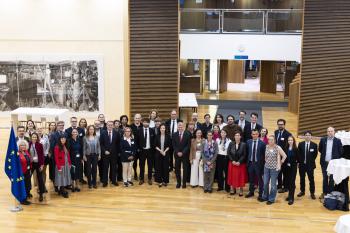IRU joined the European Commission’s Implementation Dialogue on Fair Labour Mobility in Brussels yesterday, highlighting practical, future-oriented proposals to simplify the application of EU labour rules and secure a sustainable workforce.
The high-level dialogue, hosted by the European Commission’s Executive Vice-President for Social Rights and Skills, Quality Jobs and Preparedness, Roxana Mînzatu, brought together social partners and Member States. The dialogue focused on making labour mobility simpler, fairer and more effective, which will be key to the Fair Labour Mobility Package that the Commission plans to propose next year.
Representing road transport operators employing over five million drivers in Europe, IRU highlighted critical steps to attract new talent, support fair working conditions, and strengthen the resilience of mobility systems.
IRU EU Director Raluca Marian said, “Europe has an opportunity to make labour mobility rules part of the solution to the driver shortage and workforce challenges facing our sector.
“We appreciate that strengthening the European Labour Authority’s mandate to continue supporting the enforcement of EU transport rules will be at the core of the upcoming reform. The next important milestone in road transport will be the application of the Mobility Package rules to light commercial vehicles.
“We also called for practical tools such as an EU calculator for the remuneration of posted drivers, progress on digital tools to support cross-border operations, and equal rights for all drivers, both EU and non-EU.”
Legal clarity on social security was also discussed, which remains essential for operators and drivers alike in light of the ongoing revision of the EU rules governing social security. IRU reiterated the need for harmonised, predictable rules that protect workers while allowing companies to plan and operate with confidence.
“With nearly 500,000 driver positions unfilled and the demand for road transport continuing to grow, the time to act is now,” said Raluca Marian. “The sector is ageing, with the average driver nearing 50. Less than 5% are under 25. Road transport carries 75% of Europe’s inland freight and enables most collective passenger journeys. Without drivers, the system stops.”
IRU will continue working with the European Commission, the European Labour Authority and social partners on joint enforcement guidelines, as well as a negotiated solution with trade unions on equal rights for third-country drivers.
Through collaboration and practical reform, Europe can build a more attractive, inclusive and future-ready road transport sector.

